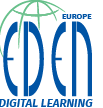
- This event has passed.
Accessibility and Inclusion in a Time of a Pandemic
June 8, 2020 @ 00:00
WATCH THE RECORDINGRegistered webinar participants will be awarded EDEN open badges.
Description
Questions to be covered over the session
- What is educational poverty?
- What impact did the pandemic have on educational poverty?
- What kind of solutions are available to ensuring ongoing education for marginalised groups?
- What is the role of technology to face such an issue?
- Does the combination of culture and technology help to find an effective solution?
Moderator
 Alastair Creelman
Alastair Creelman
EDEN Fellow
E-learning specialist at Linnaeus University, Kalmar, Sweden.
Blog: Corridor of uncertainty – reflections on technology and education
Specialist in the field of online and distance education based in the section for higher education development. Monitors developments in the field and is active in several national and international projects in areas such as distance/online learning, quality questions, open educational resources (OER), MOOCs, social media in education and virtual mobility (global classroom).
Presenters
 Antonella Poce
Antonella Poce
EDEN Fellow
Associate Professor, PhD, Head of the Centre for Museum Studies, Department of Education, Università Roma
Antonella Poce currently holds the post of Associate Professor (qualified as a full professor), in Experimental Pedagogy at the department of Education – University Roma TRE (IT), where she chairs the Centre for Museum Education and the post graduate courses: annual Museum Education and biennial Advanced Studies in Museum Education. Her expertise concerns research education methodology and evaluation. In the last five years, her interests have been focused on methods to develop and assess transverse skills and dispositions (critical thinking, creativity, collaboration and communication) in different kinds of users by combining formal, no-formal and informal methods through the use of innovative digital technologies. Currently, within her research group, she has been working on Critical Thinking automatic assessment through the analysis of open-ended questions and essays. She coordinates national research units within European projects frameworks and she has been chairing international academic committees dealing with professional development and distance learning. She is author of different publications of national and international relevance on the topics of innovation, assessment and use of technology in teaching and learning, at different levels.
Antonella Poce coordinates national units within European project frameworks and she chaired international academic committees dealing with professional development and distance learning. She is author of different publications of national and international relevance on the topics of innovation, assessment and use of technology in teaching.
 Paul Kim
Paul KimAssistant Dean & Chief Technology Officer, Stanford University
Paul Lim is Chief Technology Officer/Assistant Dean for Innovation, 2001 at Stanford University / Graduate School of Education. He is Doctor of Philosophy in Educational Technology, from University of Southern California, Los Angeles. Among his most recent publications:
- Kim, P. & Lee, J. (2020). “Evolution of Online Learning Environments and the Emergence of Intelligent MOOCs.” In K.Zhanget al.(Eds.), MOOCs and Open Education in the Global South: Challenges, Successes, and Opportunities. Routledge.
- Kim, P.& An, J. Y. (2016). “New Evaluation Vector through the Stanford Mobile Inquiry-Based Learning Environment (SMILE) for Participatory Action Research.” Healthcare Informatics Research, 22(3), 164-171.
- Kim, P., Alfaro, K., & Miller, L. A. (2015). “Ecosystemic Innovation for Indigenous People in Latin America.” Indigenous People and Mobile Technologies, 31, 59.
- Kim, P., & Chung, C. (2015). “Creating a Temporary Spontaneous Mini-Ecosystem Through a MOOC.” MOOCs and Open Education Around the World, 157.
#EDENChat
The webinar will be followed by #EDENChat.
Please join us on Twitter using the hashtag #EDENChat!
#EDENChat is an online discussion event on Twitter initiated by Steering Committee of the EDEN Network of Academics and Professionals (NAP). It is mediated by members of the NAP community and runs for approximately 1 hour. Anyone can join in and contribute to the discussion which is presented in a Question and Answer format and focuses on current issues in distance, open and e-learning. All sessions start at 18:00 CEST.
Previous #EDENChats are listed on the EDEN website according to topics.
